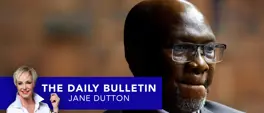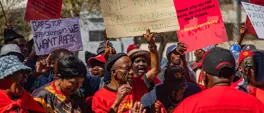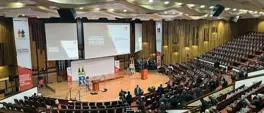Ramaphosa set to answer questions in NCOP
Babalo Ndenze
23 June 2025 | 6:00President Cyril Ramaphosa will headline this week’s parliamentary programme, where he will face questions for oral reply in the NCOP.

FILE: South African President Cyril Ramaphosa delivered the State of the Nation address at the Cape Town City Hall on 6 February 2025. Picture: Rodger Bosch/AFP
CAPE TOWN - President Cyril Ramaphosa returns to Parliament to face MPs this week, after missing last week’s appearance as he was attending the G7 summit in Canada.
Ramaphosa will face members of the National Council of Council of Provinces (NCOP) on Wednesday to face a range of questions around transformation, collapsing municipalities and youth unemployment.
The week will also see the consideration and adoption of the Division of Revenue Bill by the National Assembly, another key milestone in approving the 2025 budget.
President Cyril Ramaphosa will headline this week’s parliamentary programme, where he will face questions for oral reply in the NCOP.
One of the questions Ramaphosa will have to respond to from the Democratic Alliance (DA) is whether he agrees that the Government of National Unity (GNU) has to rework the broad-based black economic empowerment (BBBEE) policies to make them more effective and inclusive to stimulate economic growth.
The adoption of the Division of Revenue Bill by the National Assembly is another key highlight this week, because the bill legally binds the government to allocated fund distributions across all spheres of government to ensure stability.
Parliament spokesperson, Moloto Mothapo, said that on Thursday, MPs would continue the budget process by adopting the bill.
"The bill is tabled by the minister of finance, alongside the annual budget, and ensures that funds are distributed equitably to address service delivery needs, reduce inequality and support developmental priorities."
Mothapo said that the chairpersons of Parliament’s social services cluster committees would also hold a media briefing on Monday morning to address issues like the impact of recent floods on education and the role of Sector Education and Training Authority (SETA) boards.
Trending News
More in Politics

22 August 2025 17:20
Mayor Hill-Lewis believes CoCT's fixed charges are ideal for service delivery needs

22 August 2025 14:56
Parly’s budget office not forthcoming on guiding parties to amend national budget: Godongwana

22 August 2025 11:41
MPs split on use of classified info before committee probing allegations of police graft











